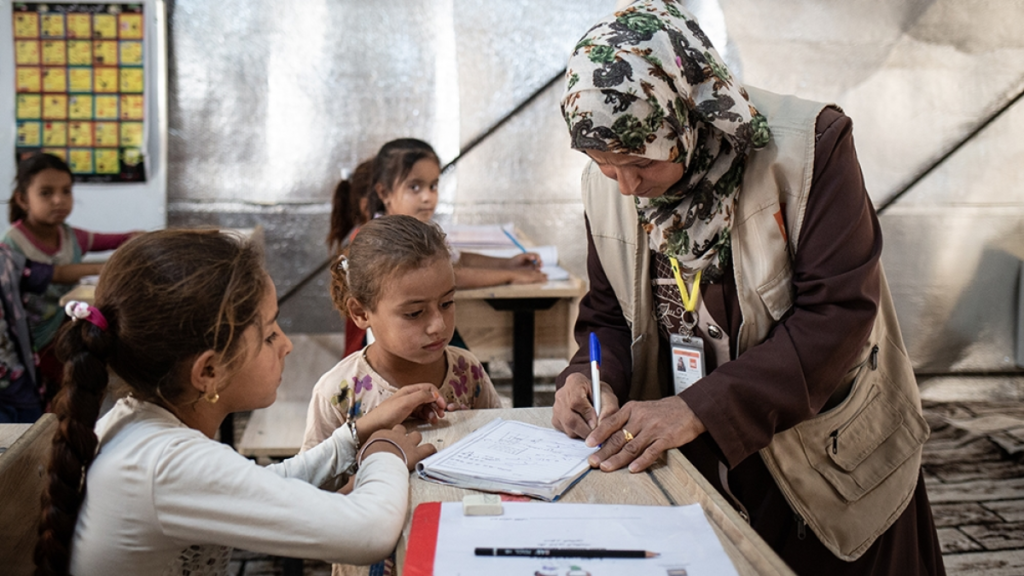Iraq’s education system challenges are growing, as teachers across the country raise their voices for fair wages, improved working conditions, and urgent reforms. Education is the backbone of every nation, yet in Iraq, decades of war, instability, and underfunding have left schools struggling, teachers frustrated, and students facing an uncertain future.
This article explores the roots of the crisis, the demands of educators, the government’s response, and the way forward for Iraq’s education system.
The State of Iraq’s Education System
Years of Conflict and Instability
Iraq’s education sector has endured decades of instability. Wars, sanctions, political conflicts, and economic downturns have weakened the system. Many schools operate with damaged infrastructure, outdated curricula, and insufficient resources.
A UNESCO report highlights that over 3.2 million children in Iraq are out of school, while many who do attend face poor classroom environments, overcrowding, and a lack of qualified teachers.
Infrastructure Problems
- Thousands of schools function in unsafe buildings.
- Many lack electricity, water, or internet access.
- Overcrowding is severe, with some schools running triple shifts to accommodate students.
For students, this means limited learning hours, poor-quality education, and little hope for future opportunities.
Teachers at the Heart of the Crisis
Low Salaries and Financial Struggles
One of the central demands of Iraqi teachers is higher salaries. Many educators earn wages that do not match the rising cost of living.
Teachers argue that their profession is undervalued compared to other government sectors. Salaries often arrive late, and in some regions, teachers are forced to work second jobs just to survive.
“We dedicate our lives to teaching children, but our pay is not enough to cover basic needs. How can we focus on teaching when we worry about feeding our families?”
Poor Working Conditions
Apart from salaries, teachers also complain about:
- Overcrowded classrooms with 50–70 students per teacher.
- A lack of teaching materials and modern technology.
- Limited training and professional development opportunities.
Many teachers feel demotivated, leading to high attrition rates and even teacher migration to private schools or jobs outside education.
Why Teachers Are Demanding Change
Protecting the Future of Students
Teachers insist that their struggle is not just about money but about saving Iraq’s future. Without well-paid, motivated educators, the quality of education declines, directly impacting students.
Curbing Brain Drain
Educated Iraqis often leave for better opportunities abroad. Improving teacher conditions may reduce this brain drain and retain skilled professionals in the country.
Addressing Inequality
Poor salaries and weak infrastructure widen the education gap between rural and urban areas. Rural students suffer the most, with fewer qualified teachers and limited facilities.

Government Response
Promises of Reform
The Iraqi government has acknowledged the problem and promised reforms. Proposals include:
- Raising teacher salaries.
- Investing in new school buildings.
- Modernizing curricula to meet international standards.
However, critics argue that progress is slow, and many promises remain unfulfilled.
Budgetary Constraints
Iraq relies heavily on oil revenue, which makes its economy vulnerable. Budget allocations for education often lose priority compared to security and infrastructure spending.
This lack of stable funding has stalled many educational projects.
Impact on Students and Families
Strained Families
Parents often bear the cost of poor education by paying for private tutors or sending their children to private schools if they can afford it.
Declining Quality of Education
Graduates often lack skills needed for the labor market. Employers complain that students are not prepared for modern careers, further straining the economy.
Psychological Toll
Students studying in overcrowded, underfunded schools face stress, low morale, and limited opportunities. This cycle risks creating a generation that feels left behind.
A Call for Urgent Action
Experts believe Iraq needs a comprehensive education reform strategy that includes:
- Improved Salaries and Incentives: to retain and motivate teachers.
- Modern Infrastructure: building safe, well-equipped schools.
- Curriculum Reform: aligning education with global and digital standards.
- Teacher Training: regular workshops and upskilling programs.
- Accountability: transparent spending of education budgets.
Lessons from Other Countries
Iraq can learn from regional neighbors:
- Jordan and UAE: invested in digital learning platforms.
- Saudi Arabia: launched large-scale teacher training programs.
- Qatar: introduced incentives for teachers to stay in public schools.
By adopting similar policies, Iraq can slowly rebuild confidence in its education system.
Hope Amid Challenges
Despite the grim picture, there are stories of resilience. Many Iraqi teachers continue their work with dedication, often buying supplies out of their own salaries to support students.
Grassroots initiatives and NGOs are also stepping in, providing scholarships, books, and infrastructure support. These small efforts show the potential of collective action to improve education.
Conclusion
Iraq’s education system challenges highlight a critical turning point. Teachers are not only demanding fair pay but also calling for respect, recognition, and reform. Their struggle represents a fight for the future of Iraqi students and the nation’s progress.
Without strong action, Iraq risks falling further behind in global education rankings. But with investment, reform, and collaboration, the country has a chance to transform its education system into one that empowers the next generation.
Do follow us: Instagram
Read More: Makkah’s Smart Waste Pilots Could Transform Holy City Forever


